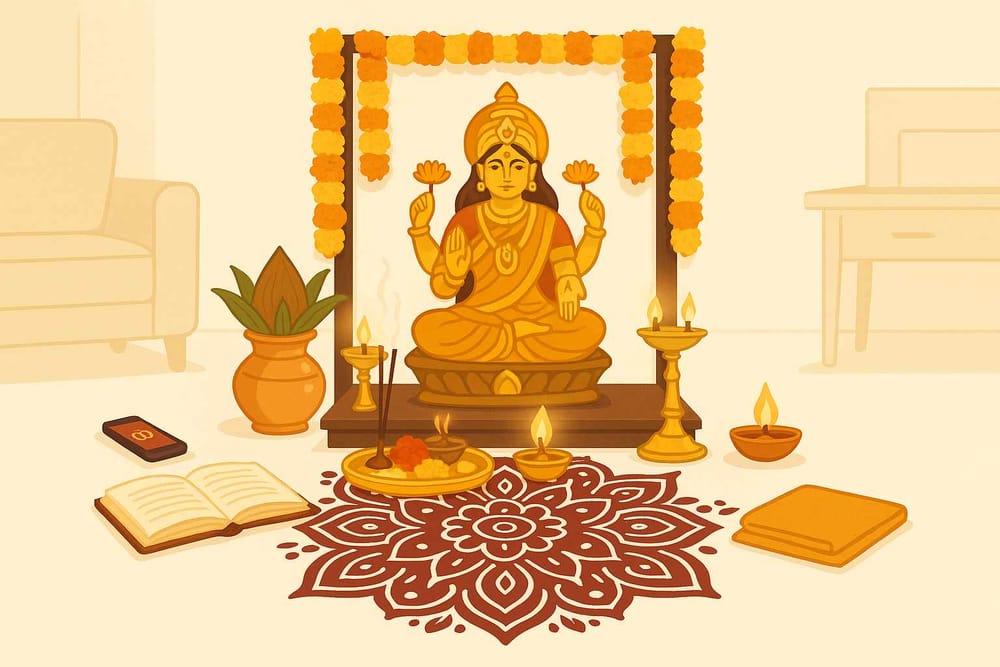
Bringing Sacred Rituals Home: Your Authentic Puja Guide
Bringing the sacredness of traditional Hindu rituals into your home can foster peace, devotion, and a deep spiritual connection. Pujas, an integral part of Hindu culture, offer a way to honor divine energies and seek blessings. This guide provides practical insights to perform these rituals authentically, balancing modern conveniences with respect for tradition.
Understanding the Dashakarma: The Ten Essential Rites in Hinduism
Dashakarma refers to the ten significant rites of passage observed throughout a Hindu's life, marking milestones from birth to death. These samskaras are more than just rituals; they provide a framework for spiritual and personal growth.
- Garbhadhana (conception ritual): Invokes blessings for the unborn child, ensuring spiritual protection and purity from the very beginning of life. It sets a sacred tone for the journey of the soul into the world.
- Namakarana (naming ceremony): Celebrates the child's identity, connecting them to their heritage and bestowing divine blessings. It is a joyous occasion where the family welcomes the newest member.
- Upanayana (sacred thread ceremony): Marks the commencement of formal education and spiritual learning, symbolizing the pursuit of knowledge and wisdom. This is a significant step towards spiritual maturity.
- Vivaha (marriage ceremony): A sacred union that strengthens familial bonds and invokes blessings for a harmonious and prosperous life together. It marks the beginning of a new chapter filled with love and commitment.
- Antyeshti (funeral rites): Ensures the soul's peaceful transition to moksha (liberation), marking the end of the earthly journey and the beginning of the soul's next phase.
Today, these rites are often adapted for convenience, such as sending digital invitations for weddings or holding simplified ceremonies in urban homes. Nevertheless, honoring Dashakarma strengthens family ties and deepens spiritual awareness.
Why Perform Puja at Home?
- Connect with the Divine: Puja is a deeply personal act of devotion, connecting you with the divine through rituals. It strengthens your spiritual practice and brings you closer to the divine.
- Create a Peaceful Atmosphere: Performing puja at home purifies the environment, bringing peace, harmony, and positive energy into your living space. It fosters a sense of serenity and tranquility.
- Strengthen Family Bonds: Daily puja offers a sacred space for reflection and gratitude, fostering a stronger connection within the family and creating a harmonious home environment. It brings the family together in a shared spiritual practice.
Essential Steps for Performing Puja at Home
- Cleanse the Space and Yourself: Prepare the puja area by cleaning it thoroughly. Purify yourself by bathing or washing your hands and feet. Light incense sticks (agarbatti) or dhoop to elevate the spiritual vibrations.
- Set Up the Altar (Mandir): Respectfully place clean idols or images of your chosen deity on a raised platform or altar. Adorn the space with a fresh cloth, ideally in auspicious colors like red or yellow. Arrange essential items such as a diya (oil lamp), flowers, kumkum, turmeric, rice, and holy water (Gangajal).
- Invoking the Deity: Begin by stating your intention, or sankalpa. Chant mantras or prayers specific to the deity you are worshipping. Common mantras include "Om Namah Shivay" (for Lord Shiva), "Shree Hanumante Namah" (for Lord Hanuman), or "Om Gan Ganpataye Namah" (for Lord Ganesha).
- Offerings (Upacharas): Offer fresh flowers, fruits, and sweets to the deity as a symbol of devotion. Offer water to the idol and gently clean it with a cloth if needed. Light a diya to invite the divine presence.
- Aarti and Pradakshina: Light camphor and perform aarti, moving the flame in a circular motion while ringing a bell. Conclude with three rounds of pradakshina (clockwise circumambulation) around the altar.
- Distribute Prasad: Share the offered food (Prasad) with family members and others as a blessing from the deity.
Essential Items (Pooja Samagri)
- Idols or Photos: Images of the deities you wish to honor. Consider the material, size, and posture of the idol based on your preference and space.
- Pooja Thali: A dedicated plate for arranging the pooja items. Choose a thali made of brass, copper, or silver for its traditional significance and durability.
- Diya (Oil Lamp): Essential for lighting and offering to the deities. The flickering flame symbolizes the dispelling of darkness and ignorance. Select from clay, brass, or silver diyas.
- Incense Sticks (Agarbatti) & Dhoop: Used for purifying the environment and creating a sacred atmosphere. Choose natural and ethically sourced incense for a purer experience.
About Bhaktilipi
Bhaktilipi.in is your digital sanctuary for devotional literature and inspiration. We offer a curated collection of sacred texts, stories, and poems, preserving the essence of bhakti while making them accessible to modern readers. Explore timeless wisdom and deepen your spiritual journey with us. Visit Bhaktilipi.in today.
Embracing Tradition with Ease
Honoring rituals brings peace and connection to our lives, reminding us of the values passed down through generations. With authentic puja items readily available online at Bhaktilipi.in, blending tradition with convenience has never been easier. Whether it's sourcing pure ghee for your diyas, beautifully crafted idols, or eco-friendly incense sticks, Bhaktilipi.in ensures that every detail matters in preserving the sanctity of your puja. Visit Bhaktilipi.in and experience the convenience of having everything you need for your puja delivered right to your doorstep.
A passionate group of people dedicated to preserving India's knowledge of Dharma, Karma, and Bhakti for ourselves and the world 🙏.
